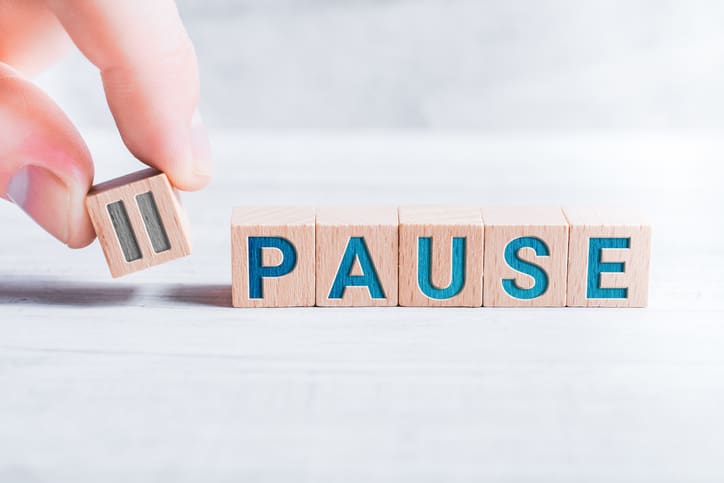As we get further into the heart of the holiday season, stress tends to ratchet up. Even if you’re not suffering from an anxiety disorder or other mental health condition, you might still feel the strain of excess spending, altered routines, and extra work (decorating, cooking, baking, gift wrapping, event planning, family negotiations, etc.). Dealing with mental health issues on top of all of this can be daunting, to say the least.
In our post “Reach Out for Mental Health Support This Thanksgiving,” we encouraged you to ask for help during stressful times and reviewed some of the reasons we shy away from asking for help. This week we offer an additional tip (not a replacement tip–you should still ask for help!): Pause.
This holiday season–or anytime you’re feeling stressed–remember the power of the pause. It can do wonders when you’re feeling reactive, emotional, wound up, or tired. We’ll look at some examples of how to put the pause to use, after a brief reminder of how stress affects the body and mind.
The Effects of Stress
Sometimes it might feel easier to just put your head down and plow through a monumental to-do list, no matter the cost to your body and mind. You’ll have time to recover later, after the stressful event is over, right?
Well…maybe? But if “get it over with” or “suffer now and rest later” rather than “re-evaluate and ask for help” is your general response toward stressful events, chances are that you’re living in a state of chronic stress. The rest you promise yourself never actually materializes. Or, it materializes in the form of sickness, forcing you to take a break.
Is this mindset worth the cost? The Mayo Clinic provides a handy–and eye-opening–table showing the effects of stress on body, mood, and behavior, which we’ve summarized below:
Body effects:
- Headaches, chest pain, stomach pain or indigestion
- Muscle tension, fatigue, difficulties sleeping
- Change in sex drive
- Weakened immune system
Mood effects:
- Anxiety, restlessness, feeling overwhelmed
- Lack of focus, memory problems
- Lack of motivation
- Irritability, anger, sadness, depression
Behavior effects:
- Overeating or undereating
- Avoiding friends/staying at home
- Exercising less
- Increased substance use (alcohol, drugs, tobacco)
In addition to causing health issues, stress can also increase our tendency to ruminate on our problems. According to the Columbia University Irving Medical Center: “[…] recent research of ours found that when people spent more time thinking about a stressor, they had higher levels of stress, and we showed that more time spent mentally stewing in our problems may be associated with higher blood pressure.” In other words, the more you think about how stressed you feel, the worse the health impact.
What can you do when demands pile up and you can’t imagine how you’ll cope with them all?
Pause.
How and When to Pause
What does it mean to pause? Let’s look at some situations that might call for a pause.
- You’re thinking about all you have to do this week and starting to feel overwhelmed and panicky. PAUSE.
- You’re trying to finish a project, and it’s not going well, and you’re getting really frustrated. PAUSE.
- You’re cleaning while your children and/or partner play video games, and you can feel the rage building. PAUSE.
- You can’t get the jar of olives open, and you’re ready to burst into tears. PAUSE.
- You can barely stay awake on your way to work because you can’t sleep at night. (Pull off the road and) PAUSE.
- You can’t decide on a gift for your father, and you’ve been scrolling through pages of gift ideas online until your eyes hurt. PAUSE.
Okay, so you’ve paused. Now what?
Well, first, congratulations. Simply remembering to pause and then doing it is most of the battle. Pause until your heart rate returns to normal, your breath is calm, your thoughts stop spinning, and your emotions soften. It may take 2 minutes, or it may take 20. What do you do with yourself during the pause? Here are some ideas:
- Close your eyes and focus on a slow, steady breath.
- Listen to a favorite song.
- Go outside (or look out the window).
- Write down or talk through (to yourself) what you’re feeling. You’re feeling really frustrated right now. That’s okay. This is a stressful time. You’ve done such good work today. What you need right now is to remember that you’re allowed to ask for help. Etc.
- Take a short walk.
- Think of three things you feel grateful for. Feel the gratitude.
- Call someone you love.
These activities, engaged in for just a few minutes, can do wonders to help you regain perspective, calm your emotional response, and feel hopeful again. When you’re feeling calm and focused, you’ll have an easier time knowing how to prioritize your tasks, and you’ll know who you can ask for help.
Pause with Us at Raleigh Oaks Behavioral Health
As helpful as the pause can be, it’s no substitute for mental health treatment if you’re suffering from anxiety, depression, bipolar disorder, or another condition. If the holiday season becomes too much, take a longer pause with our compassionate team here in Garner, NC. We will work with you to stabilize your condition and learn the skills you will need to stay healthy when you return home.






